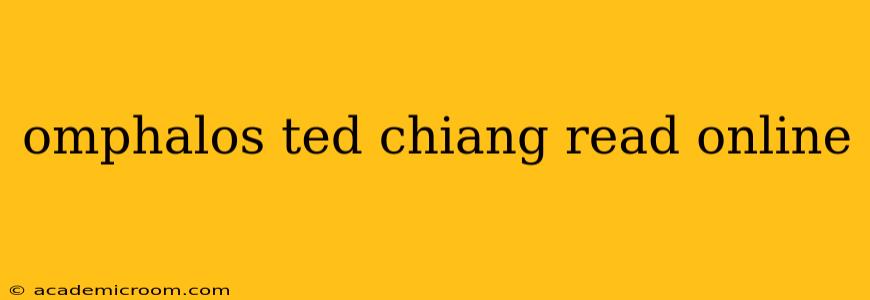Ted Chiang's "Omphalos," a captivating short story, delves into the profound implications of a world where scientific evidence supports the literal truth of creation myths. This isn't a simple tale of faith versus science; instead, it's a complex exploration of epistemology, belief, and the very nature of reality itself. Chiang masterfully weaves a narrative that leaves the reader questioning their understanding of truth, evidence, and the limits of human perception.
This article will explore "Omphalos" in detail, examining its central themes and answering some frequently asked questions about this thought-provoking piece of science fiction.
What is the central theme of Ted Chiang's "Omphalos"?
The central theme revolves around the implications of a world where the scientific method confirms a creation myth. In this meticulously constructed reality, all scientific evidence points towards a young Earth, created only six thousand years ago, complete with a fully formed history and fabricated fossils. The story challenges us to consider what constitutes "proof" and how our understanding of evidence is shaped by our pre-existing beliefs. It forces a confrontation with the inherent limitations of scientific inquiry in the face of a reality designed to deceive. The core conflict lies not in science versus religion, but in how we define truth and reality itself when our fundamental assumptions are shattered.
What is the significance of the Omphalos paradox in the story?
The Omphalos paradox, which serves as the backbone of the narrative, states that if God created the universe with the appearance of age (including false memories and false evidence), then we would be inherently incapable of distinguishing between a truly old universe and a recently created one. This seemingly paradoxical idea perfectly encapsulates the central conflict: if our understanding of the universe is inherently flawed from the outset, how can we ever be sure of anything we believe to be true? The story uses the "Omphalos" (the navel of the world, traditionally believed to be the center of creation) as a metaphor for this manufactured reality, a perfectly created illusion designed to mislead.
How does "Omphalos" explore the nature of belief?
"Omphalos" doesn't simply present a dichotomy between faith and science; instead, it explores the multifaceted nature of belief itself. The story highlights the power of pre-existing beliefs to shape our interpretation of evidence. In the story's world, individuals who accept the young Earth theory have a vastly different understanding of the world compared to those who find the revelation unsettling and incomprehensible. This highlights how we actively choose what to believe, often irrespective of objective evidence. The story subtly questions whether the pursuit of truth is as straightforward as we often assume.
Can I read "Omphalos" online for free?
Unfortunately, accessing "Omphalos" for free online might be challenging as copyright restrictions apply. However, exploring legal online resources and libraries could help you find access. Many university libraries may offer online access to the collection that contains the story. Checking with your local library system for digital borrowing options might also be fruitful.
Is "Omphalos" a religious story?
While "Omphalos" engages with theological concepts, it's not primarily a religious story. It doesn't advocate for or against any particular religious belief. Instead, it uses the concept of a created reality to explore fundamental philosophical questions about knowledge, belief, and the nature of reality itself. The story challenges our assumptions about both scientific inquiry and religious faith, forcing readers to confront the limitations of human understanding.
What is the ending of "Omphalos" and what does it mean?
The ending of "Omphalos" is open to interpretation. It leaves the reader contemplating the implications of a reality that could be fundamentally different from what they perceive. This ambiguity is precisely the point. Chiang isn't providing easy answers but rather forcing a deeper examination of the fundamental questions about truth and reality. The unsettling nature of the conclusion underscores the story's exploration of the uncertain nature of our understanding of the world around us.
Where can I find other works by Ted Chiang?
Ted Chiang is a celebrated author known for his meticulously crafted and intellectually stimulating short stories. To explore his other works, you can search online bookstores or libraries. His collection, Stories of Your Life and Others, is highly recommended and contains several of his most celebrated works.
Ted Chiang's "Omphalos" is a powerful and unsettling exploration of our relationship with truth and reality. Its enduring appeal lies in its ability to challenge our fundamental assumptions and provoke thought-provoking discussions long after the story concludes. Its continued relevance emphasizes the ongoing need for critical thinking and a nuanced understanding of the complex interplay between science, faith, and the search for meaning in our lives.
